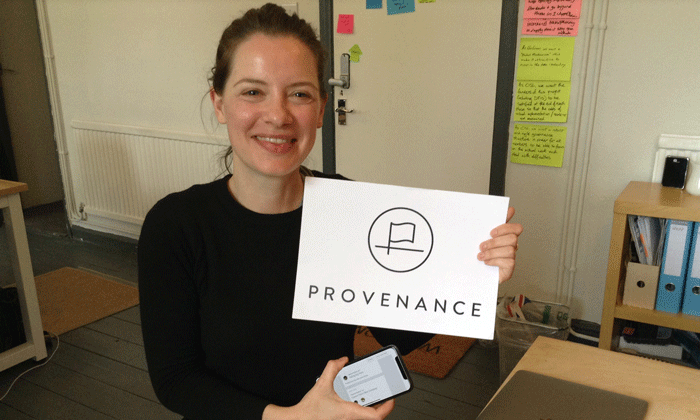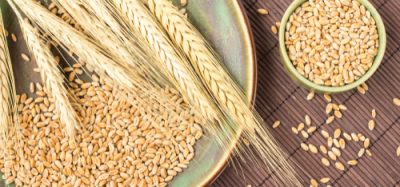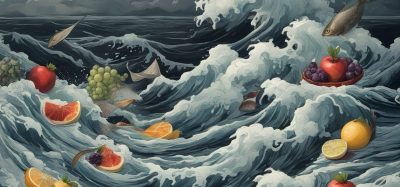BBC Future Food Award celebrates supply chain innovation
- Like
- Digg
- Del
- Tumblr
- VKontakte
- Buffer
- Love This
- Odnoklassniki
- Meneame
- Blogger
- Amazon
- Yahoo Mail
- Gmail
- AOL
- Newsvine
- HackerNews
- Evernote
- MySpace
- Mail.ru
- Viadeo
- Line
- Comments
- Yummly
- SMS
- Viber
- Telegram
- Subscribe
- Skype
- Facebook Messenger
- Kakao
- LiveJournal
- Yammer
- Edgar
- Fintel
- Mix
- Instapaper
- Copy Link
Posted: 7 June 2018 | Mike Stones (New Food) | No comments yet
Making a future for heritage grains, cereals grown by robots, without direct human intervention, and greater food supply chain assurance, provided by blockchain technology, are the three big ideas behind this year’s contenders for the BBC Farming Today Future Food Award.


INNOVATION: Provenance founder Jessi Baker believes blockchain technology could empower consumers' to buy sustainably-produced food
The award, part of the BBC Food and Farming Awards, celebrates cutting-edge innovation in the food supply chain. It seeks to highlight pioneering work that could influence how the UK’s food will be grown, distributed and sold in future.
The award judges – John Vincent, co-founder of fast food chain Leon, and Mike Stones, managing editor or New Food – were looking for repeatable, scaleable ideas that set a path for others to follow in the food and drink supply chain.
Their first judging visit was to Heritage Harvest, the Buckinghamshire-based business run by John Letts, who is developing a future for ancient varieties of grains. His bold ambition is rejuvenate local grain-based economies, in which heritage varieties of grains are grown to supply local millers and bakers. Producing the Lammas Fayre range of heritage flour on his Oxfordshire farm, Mr Letts specialises in growing old – sometimes very old – varieties of grain that were popular before hybridisation was introduced around 1909.
Typical varieties include: einkorn wheat, Emmer wheat and a Medieval blend of wheat and rye known as Maslin.
Ancient varieties, with their inherent adaptability compared with contemporary cultivars, are better able to withstand the onslaught of changing profiles of pests and diseases and drought stress fostered by climate change, he argued. Also, heritage grains have a richer nutrient profile and produce bread and bakery products with improved taste, according to Mr Letts.
Listen to Mr Letts explain more about how heritage grain can deliver what he claims to be greater crop resilience, pest control, soil health, nutrition and flavour in BBC Radio 4’s On Your Farm profile of his business.
Without direct human intervention
The second finalist in the Future Food Award was a research project to grow cereal crops autonomously without direct human intervention at Harper Adams University in Shropshire. Hands Free Hectare grew the world’s first cereal crop autonomously – using only robots and drones – last year. The crop of spring malting barley – which is now being brewed into Hands Free beer – was drilled, fertilised, weeded, monitored and harvested by autonomous machinery without direct human intervention on the ground.
The idea behind the initiative, which relies on a small lightweight combine and harvester, is to minimise the impact of soil compaction, which is estimated to cost UK agriculture more than £200M a year, said the project leader Kit Franklin, Lecturer in the Agricultural Engineering Department. Such technology also enabled the more precise use of fertiliser and pesticide inputs. But how practical is the idea?
“Our general belief is that over the next five years you will see autonomous systems in niche, high-value, high precision activities,” said Mr Franklin, who highlighted applications in viniculture. “From there, it will move to broadacre farming. Maybe, in the next 10-15 years autonomous farming systems will become a commonplace sight in our countryside.”
Radio 4’s On Your Farm profile of Hands Free Hectare can be heard here.
Empowers brands to improve transparency
The third finalist in the Future Food award was the London-based digital company Provenance, empowers brands to improve the transparency of their supply chains using blockchain technology.
A secure digital ledger, blockchain enables transactions to be recorded chronologically and publicly in a way that cannot be retrospectively changed. Provenance is applying the technology to provide assured information about the nature of food production, the inputs its receives and the location of its production. Using mobile, blockchain and open data, the software enables retailers and producers to open product data, tracking the journey of goods, and empowering customers with access to knowledge.
Provenance founder Jessi Baker said the technology could spark a revolution in the way consumers choose food. “Using blockchain will enable consumers to focus their purchasing power on food and drink products and production systems that meet their aspirations,” Ms Baker told the judges. So consumers could choose to buy only products that were produced in sustainable ways that complemented their values. Listen to Radio 4’s On Your Farm profile on Provenance here.
https://www.bbc.co.uk/programmes/b0b4zdn1
This year’s winners will be revealed at an award ceremony in Bristol on Wednesday June 13. Learn the identity of the BBC Farming Today Future Food Award next week at newfoodmagazine.com and on Twitter @NewFood.
Learn more about the BBC Food and Farming Awards here.
Meanwhile, meet last year’s Future Food Award winner and finalists in the box below.
Last year’s Future Food Award winner and finalists
Winner: Growing Underground
Growing Underground grows micro greens and salad leaves 33 metres below the busy streets of Clapham, London in Second World War air raid shelters. Their crops are grown year-round in a pesticide-free environment using hydroponic systems and LED technology near the heart of the capital.
Finalist: Islander – Rathlin Kelp
Based in a Marine Conservation area off the Rathlin coastline of Northern Ireland, Islander – Rathlin Kelp produces fresh kelp and kelp products. Its product range includes: noodle cut, tagliatelle cut, salad cut, minced and whole leaf and they also make kelp pesto with over 60% kelp.
Finalist: The Seed Co-operative
The Seed Co-operative is a community seed initiative dedicated to growing open pollinated varieties that anyone can grow on. The co-operative focuses on open pollinated varieties to counter what it describes as over concentration in the global seed industry. Rejecting seed biotechnology, the co-operative claims it is on a mission to provide seeds anyone can afford and to protect genetic biodiversity.
Related topics
Clean Label, Equipment, Food Fraud, Free From, Herbicides, Packaging & Labelling, Research & development, Supply chain, Sustainability, Technology & Innovation, Traceability, Trade & Economy
Related organisations
BBC, Growing Underground, Harper Adams University, Heritage Harvest, Islander - Rathlin Kelp, Leon, Provenance, The Seed Co-operative









